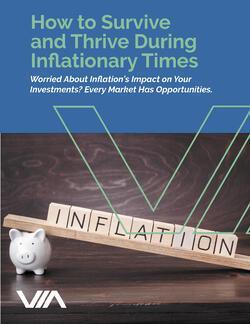

How To Find A Qualified Minneapolis Retirement Planner?
If you’re a high-net-worth individual nearing retirement, it’s important to start thinking about your retirement planning options. One of the best ways to ensure a smooth and successful transition is to work with a qualified Minneapolis retirement planner.
However, finding the right financial planner can be tricky: There are many of them out there.
So, how do you know which one is right for you? In this blog post, we outline tips for finding the right Minneapolis retirement planning professional for your specific needs.
This article addresses the following (and more):
- What are you seeking in a retirement planner?
- How about asking friends or family for a referral?
- Why is the Internet your best bet for searching?
- How do you measure a retirement planner’s knowledge?
Are You in Need of Investment Advice From an Experienced Team of Financial Professionals? Consider Meeting With the ViaWealth Team.
What Are You Seeking in a Retirement Planner?
Ideally, you want to work with a financial planner who can document that they meet the following requirements:
- They are a fiduciary financial advisor
- They are transparent, documenting their fees and any possible conflicts of interest
- They provide the services you are seeking
- They work with clients similar to you
How About Asking Friends or Family for a Referral?
This can be a simple solution, assuming that a friend or a family member has the same financial needs and requirements as you. However, rather than relying solely on word-of-mouth referrals, it’s important for you to do your own due diligence.
Vet your likeliest candidates on important considerations like their knowledge, ethics, services, competitive pricing, and results. If this seems too potentially time-consuming, think of the Bernie Madoff investors who placed their hard-earned money with him because of word-of-mouth referrals: Had they done some form of due diligence, they might have made a different decision.
Why Is the Internet Your Best Bet for Searching?

The Internet makes the first step easy. All you have to do is enter a few keywords, like “find a retirement planner in Minneapolis.” In seconds, you will have hundreds of alternatives at your fingertips. You can also learn a lot about prospective retirement planners early by visiting their websites and Google-searching their names.
Using the Internet also allows you to remain anonymous for the early phase of searching. You can retain your privacy far more easily while screening retirement planners online than you might in person. You only have to disclose your contact information when you are ready to start the interviews.
How Do You Measure a Retirement Planner’s Knowledge?
It stands to reason that you want an experienced retirement planning professional to advise you financially. Since every planner you research may claim to be a planning expert, how do you find the right wealth manager for your needs?
Here are four characteristics that can help you determine the experience and expertise of financial advisors during your evaluation process:
- A degree from an accredited college or university (advanced degrees are preferred)
- Years of experience providing retirement planning services to the affluent
- Relevant certifications from accredited institutions
- Memberships in associations with continuing education requirements
Some of the most highly regarded planning certifications include CFP®, PFS (if the planner is a CPA), and ChFC®. Some association memberships have continuing education requirements, as well.
How Do You Measure Their Trustworthiness?
There are two definitions of trust that impact the financial well-being of retirement planning clients in Minneapolis:
- They will always provide advice and services in the best interests of their clients.
- They will always disclose potential conflicts in writing—in advance.
At the same time, there are other criteria that can impact the quality of a financial advisor’s insights and asset management services. For instance, you should check their record of compliance at IAPD.
Next, verify whether or not they are a financial fiduciary. If they are, their firm is probably a registered investment advisor or investment advisory representative. Be sure to verify how they are compensated, as well.
We Believe You Deserve the Best Thinking of Specialized Financial Professionals. Get To Know ViaWealth.
How Are Financial Advisors Compensated?
Only registered investment advisors and investment advisory representatives have registrations that allow them to charge fees for their advice and services. Conversely, there are also planners whose only method of compensation is a commission on the sale of investment and insurance products.
The distinction between the two can be important. Some retirement planners are paid with an asset-based fee that is expressed as a percent of assets. This frequently covers their planning and investment services in a bundled approach. However, these fees can also be charged separately from each other.
Some advisors are compensated for their retirement planning knowledge and services with a fixed fee (such as $2500). Meanwhile, others may bill hourly, like CPAs and attorneys, with a minimum number of hours required to produce a plan.
Still, other retirement planners in Minneapolis are compensated with commissions from the sale of investment and insurance products. This commission covers the cost of their retirement planning advice and services.
What Are Some Red Flags That Could Impact You?

Red flags will vary by retirement planner, their business practices, and their consequences may impact you. Nevertheless, if you pay attention, they aren’t usually terribly difficult to spot.
For example, be cautious when a retirement planner says that their advice and services are “free:” Nothing is really free in the financial service industry. This claim usually means the planner is being paid by a third party (mutual fund, insurance company) to sell you their products.
Similarly, if a retirement planner claims to be an “expert,” but they cannot provide any documentation confirming that as fact, be wary. The best information is often what you can find in the public domain.
Be especially cautious whenever an advisor is not willing to document claims about their credentials, ethics, services, fees, or compensation: Documentation is important—because verbal information is easy to manipulate.
For example, a sales pitch can be construed as verbal information, though you might have no record (or thorough idea) of what was said to you. At the same time, verbal information is not admissible in arbitration, should a future dispute arise.
ViaWealth is an experienced team of fiduciaries who happily provide documented answers to questions about their compensation, services, ethics, and more. Contact us today to experience the difference.
ViaWealth, LLC is a Registered Investment Adviser. Information in this article is for educational purposes only and is not intended to be an offer or solicitation for the sale or purchase of any specific securities or other types of investments. Investing in the securities markets involve risk of principal and unless otherwise stated, returns are not guaranteed. Be sure to consult with a qualified financial adviser and/or tax professional before making any financial decisions. Past performance is not indicative of future performance.


